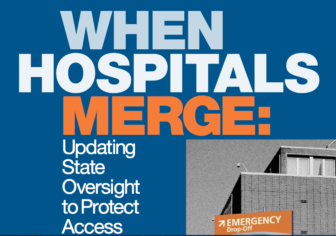Officials at St. Mary’s Hospital and Waterbury Hospital began negotiations in 2011 to merge and join a Texas-owned company.
![]() But the state Permanent Commission on the Status of Women—with MergerWatch, a hospital watchdog group—successfully argued against the merger by making the case that since the new hospital would honor Catholic religious directives, a significant portion of patients would be left vulnerable—because God help you if you are a woman and need emergency reproductive services at a Roman Catholic hospital.
But the state Permanent Commission on the Status of Women—with MergerWatch, a hospital watchdog group—successfully argued against the merger by making the case that since the new hospital would honor Catholic religious directives, a significant portion of patients would be left vulnerable—because God help you if you are a woman and need emergency reproductive services at a Roman Catholic hospital.
Medical professionals at Catholic-owned or -sponsored hospitals operate under directives—known officially as the Ethical and Religious Directives for Catholic Health Care Services. These directives come from the United States Conference of Catholic Bishops and take 43 pages (plus footnotes) to describe what constitutes appropriate Catholic health care.
As might be expected, the rules ban abortions, but they go much deeper.
“What people don’t realize is the other, more quiet and sometimes insidious ways that these kinds of takeovers can play out—and not just with reproductive care, but with end of life care,” said Carolyn Treiss, executive director of the commission.
 So here’s irony for you. Legislators bowed to the state’s budgetary crisis in May and consolidated the not-so-permanent commission with two other state watchdog agencies. On her way out the door, Treiss is writing a memo that includes hospital mergers among the commission’s priorities. But with a smaller staff, hospital mergers may not be high on their list of priorities. Other organizations, among them Planned Parenthood of Southern New England and Connecticut Women’s Education and Legal Fund, will have to take up the slack.
So here’s irony for you. Legislators bowed to the state’s budgetary crisis in May and consolidated the not-so-permanent commission with two other state watchdog agencies. On her way out the door, Treiss is writing a memo that includes hospital mergers among the commission’s priorities. But with a smaller staff, hospital mergers may not be high on their list of priorities. Other organizations, among them Planned Parenthood of Southern New England and Connecticut Women’s Education and Legal Fund, will have to take up the slack.
And this is important. In an era of hospital mergers, according to an American Civil Liberties Union report released in May, one in six hospital beds in this country are in hospitals that comply with Catholic directives. Using data provided by MergerWatch, the study said that women seeking critical reproductive health care services are routinely denied services—sometimes at great risk to the patients.
According to a MergerWatch study from earlier this year, 14.5 percent of all U.S. acute care hospitals are Catholic-owned. In five states—Alaska, Iowa, Washington, Wisconsin and South Dakota—more than 40 percent of those hospitals are operating under Catholic directives. In another five states—Nebraska, Colorado, Missouri, Oregon and Kentucky—between 30 percent and 39 percent of hospitals are Catholic-owned or Catholic-affiliated.
Catholic hospitals in Connecticut include Mount Sinai Rehabilitation Center and St. Francis Hospital & Medical Care in Hartford, St. Mary’s Hospital in Waterbury, the Johnson Entities (including Johnson Memorial Medical Center) in Stafford Springs, and St. Vincent’s Medical Care in Bridgeport. All serve economically vulnerable populations in some of the state’s poorest neighborhoods. Each receives money from the federal government, yet they are allowed to impose their religious values on patients who may not share them.
Depending on the language of the agreements, hospital mergers can birth the strangest of rules. A 2012 New Haven merger between the Hospital of St. Raphael and Yale-New Haven Hospital allows the St. Raphael’s campus to continue to follow Catholic directives.
In 2015 St. Francis joined Trinity Health, one of the country’s largest Catholic-sponsored health care systems with 60 acute hospitals and 13,506 staffed-beds, according to MergerWatch. Nearly 46 percent of its money comes from Medicare or Medicare. When a hospital receives Medicare or Medicaid payments, that hospital must provide a certain level of care. So how does that jibe with the list of don’ts from the non-medical professionals at the conference of bishops?
With the demise of the commission, how the next threat to women’s health will end is anybody’s guess. Maybe we should all pray?
Susan Campbell is a distinguished lecturer at the University of New Haven. She can be reached at slcampbell417@gmail.com.